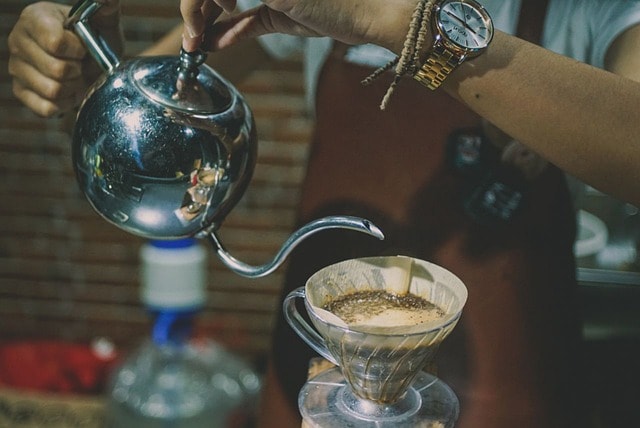If you’ve browsed the menu at your local café, you might have wondered what decaf coffee’s point is. After all, for many, the primary lure of coffee is its ability to kickstart the day with a dose of caffeine. So why choose a cup without the pick-me-up?
This blog will dive into everything there is to know about decaf coffee. We will discuss the benefits and health effects of decaf coffee. We will also explore why people drink decaf coffee and what is the purpose of decaf coffee.
Understanding Decaf Coffee
Decaf, short for decaffeinated coffee, might seem like an oxymoron to hardcore caffeine lovers. However, it holds a significant place in the coffee world.
Decaf coffee goes through a process that removes at least 97% of the caffeine from the beans. The result is a brew that retains the coffee’s flavors and aromas but has minimal caffeine content.
Decaf coffee allows everyone to enjoy the rich, full flavor of coffee without the effects of caffeine. This appeals to those who love coffee but must limit their caffeine intake for health reasons. Whether it’s late in the evening or part of a health-conscious routine, decaf offers a comforting alternative.
Moreover, decaffeination has evolved to preserve the taste and quality of the coffee beans. This ensures that even without caffeine, decaf coffee drinkers still get the satisfying experience of a bold and aromatic cup. This makes decaf an excellent choice for casual and avid coffee drinkers alike.
How Decaf Coffee Is Made
Processing decaf coffee begins much like any other coffee. However, before roasting, the beans undergo a decaffeination process. Several methods are used to extract caffeine, including water (Swiss Water Process and Mountain Water Process, carbon dioxide, and organic solvents. Each technique aims to minimize the impact on the coffee’s natural flavors.
Decaf coffee allows everyone to enjoy the rich, full flavor of coffee without the effects of caffeine. This is ideal for those who love coffee but must limit their caffeine intake for health reasons. Whether it’s late in the evening or part of a health-conscious routine, decaf offers a comforting alternative.
Decaffeination has evolved to preserve the taste and quality of the coffee beans. This ensures that even without caffeine, decaf coffee drinkers still get the satisfying experience of a robust and aromatic cup. This makes decaf an excellent choice for casual coffee drinkers and experts alike.
Why Do People Drink Decaf Coffee?
To understand why people drink decaf coffee, consider why someone might prefer it over regular coffee. For many, decaf is a way to enjoy the taste of coffee without the stimulating effects of caffeine. This can be particularly appealing for those sensitive to caffeine, with certain medical conditions, or who want to enjoy coffee later in the day without risking their sleep quality.
Decaf coffee is not just about what’s missing (caffeine); it’s also about what it offers. Here are some benefits of decaf coffee:
- Reduced Anxiety: Since caffeine can increase cortisol production and heighten anxiety, decaf can be a comforting alternative for those who are prone to these issues. Choosing decaf means you can still enjoy coffee without worrying about feeling jittery or on edge afterward. This makes it a great choice for relaxing in the evening or winding down after a busy day.
- Healthier Digestion: Decaf is often gentler on the stomach, making it suitable for those with acid reflux or other gastrointestinal issues. Decaf reduces the risk of coffee-related digestive discomfort, such as heartburn or stomach aches, making your coffee experience much more enjoyable.
- Rich in Antioxidants: Like regular coffee, decaf contains antioxidants, which help combat free radicals and promote overall health. These antioxidants contribute to numerous health benefits, including reduced inflammation and enhanced heart health.
Caffeine Content in Decaf Coffee
When discussing caffeine content in decaf coffee, it’s important to note that it does not mean caffeine-free. A typical 8-ounce (237 ml) cup of decaf coffee still contains about 2 to 5 mg of caffeine, compared to 70-140 mg in regular coffee.
The health effects of decaf coffee have been the subject of much debate and research. Studies suggest drinking decaf coffee could be linked to a reduced risk of certain diseases, such as type 2 diabetes and neurological disorders, similar to regular coffee.
However, the decaffeination process can vary, and some methods involve chemicals. Although the final product typically has trace amounts that are considered safe by health standards,
Even a tiny amount in decaf can sometimes be too much for those sensitive to caffeine. It’s important to consider this when choosing your coffee, especially if you are affected by even minor amounts of caffeine. In such cases, looking for coffee labeled as ‘caffeine-free’ rather than ‘decaffeinated’ might be a better option.
Always check the label and understand the caffeine content to ensure it fits your dietary needs.
Choosing the Best Decaf Coffee
When choosing decaf coffee, consider both the source of the beans and the decaffeination method. Look for brands that use organic and chemical-free processes. These tend to maintain the bean’s flavor and ensure you’re drinking something that’s not only enjoyable but also as healthy as possible.
When shopping for decaf coffee, find out where the coffee beans are sourced. Beans from reputable farms known for sustainable practices are of higher quality. You can also check for certifications like Fair Trade and Organic. This will give you peace of mind about your coffee’s ethical and environmental aspects.
End Note
What is the purpose of decaf coffee?
It provides an option for those who love coffee but either can’t tolerate caffeine or choose to avoid it for health reasons. Whether you’re looking to reduce your caffeine intake or you enjoy a late-night cup without the sleeplessness, decaf coffee offers a practical solution.
Decaf is a simple way to enjoy a cup for its flavor and warmth. Next time you need a cup, remember that decaf might surprise you with its depth and variety.



